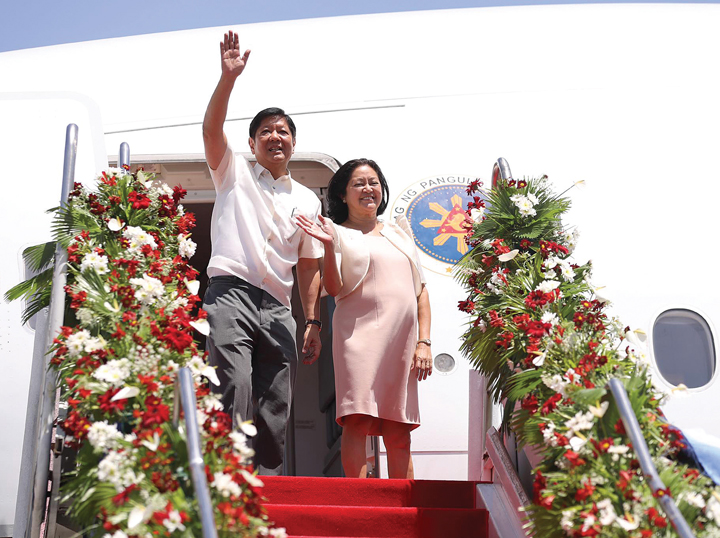Economic and diplomatic relations between the Philippines and the European Union (EU) are still headed toward different directions, as diplomacy is going south due to President Duterte’s rants against foreign interference in domestic affairs while bilateral trade continues to soar.
This was evident during discussions at the EU-Philippines Business Summit on Tuesday.
“In economic terms, they [EU] are now our no. 2 export market, coming from the third spot last year. Economic relations are good. Even the EU-GSP+ [Generalized System of Preference-Plus] utilization has been increasing; and we’re expecting greater utilization,” Trade Secretary Ramon M. Lopez said.
But the EU delegation in Manila wouldn’t commit if the Philippines will continue to enjoy the preferential trade scheme.
EU Ambassador to the Philippines Franz Jessen, sought for comment on the prospects of the country’s continued enjoyment of the EU-GSP+, commented: “Let’s just wait for the report [of the commission] in January.”
According to data from the Philippine Statistics Authority, total merchandise exports to the EU increased by 36 percent in the first half of 2017, amounting to $4.6 billion. This is quicker than the average growth rate of Philippine exports to the EU in recent years of about 15 percent.
But the trade chief sustained the stance of the President in the event, stressing before the European business community: “Any interference is viewed as preventing us from doing our job. Any interference in the pursuit of this [anti-illegal drugs] program will never sit well with any of us in the government, especially with our passionate President. We can all expect a strong reaction against any form of interference.”
European Chamber of Commerce in the Philippines President Guenter Taus assured that the new round of castigation from the Chief Executive is not affecting EU-Philippines economies ties, saying: “While it’s difficult to maneuver in this situation, it hasn’t stopped investments from coming in.”
Taus added that negotiations for the broader EU-Philippines free-trade agreement are “ongoing.” “This isn’t new for us; we’ve heard it before and there’s been no effect on business on the ground,” Taus added.
These sentiments notwithstanding, the EU institutions—including the European Commission, the Parliament and the Council—will still be deciding whether the Philippines will continue to enjoy preferential treatment under EU-GSP+, which is credited for the huge hike in Philippine exports to EU. The EU-GSP+ review is ongoing.
The Philippines is the only country in Asean that is enjoying duty-free treatment for two-thirds of the tariff lines of its exports to the EU.
Continued enjoyment of this scheme is dependent on the observance of 27 international treaties and conventions, including those covering human rights.
Just a few weeks ago, the trade chief met with the European Commission in Brussels to showcase the benefits of the EU-GSP+ to Philippine exports, crediting the scheme as responsible for pushing exports from €5.7 billion in 2014 to €6.9 billion in 2015.
To recall, President Duterte once again launched a tirade against the “EU ambassadors” last week, challenging them to vacate their posts in 24 hours in reaction to previous comments from two political Europe-based groups.
The two groups—the Progressive Alliance and the Party of European Socialists—made a visit to the Philippines recently and warned the government against the continued extrajudicial killings in the conduct of the war against drugs.
Board of Investments Managing Head Ceferino S. Rodolfo said given the strong performance of local exports to the EU market in the first half, there may be momentum to sustain the over 30-percent growth throughout the year.
“Based on the strong first-half performance of 36-percent growth, we expect exports to the EU to remain robust because of the stable economic environment in the EU. There is robust demand for Philippine exports, especially those benefiting from the EU-GSP+,” Rodolfo underscored.
Jessen is optimistic exports may even reach $10 billion by end of the year.
From January to August, Philippine merchandise exports to the EU amounted to $6.1 billion, taking a share of 15 percent in the country’s total exports.
This is an improvement over the same period in 2016, when exports were valued at $4.6 billion and a share of just 12.4 percent.
In full year 2016, exports to the EU reached $6.9 billion, and around $1.8 billion were covered by the EU-GSP+ scheme. In 2015 EU-GSP+ exports totaled $1.7 billion.
Top exports include electrical machinery and equipment, appliances, animal fats and oils and preparation of meat. Among the Philippines’s top exporters to the EU are Cargill Philippines, Moog Controls, Del Monte Philippines and Sun Power.





































